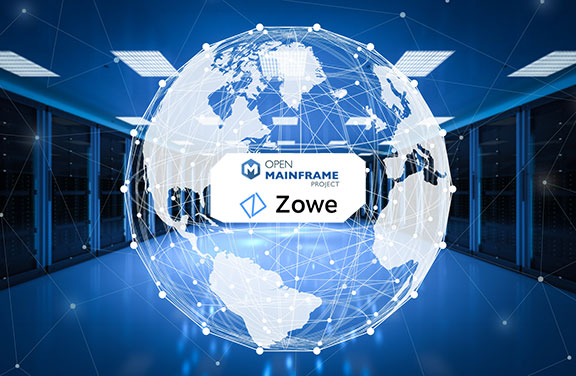Partner Development Executive
Organizations are facing many challenges in today’s DevOps landscape. In our discussions with customer executives, we have heard several commonalities indicating the struggle to better unlock their enterprise DevOps capabilities. These include, but are not limited to:
- Deployment of business applications are now spanning a hybrid architecture to include On Premises as well as Cloud
- Application lifecycles have taken on a new level of complexity
- Employee skill sets now span even broader requirements than ever before
Organizations are challenged with modernizing their core business applications without having to rip and replace or migrate from their enterprise-class platform investment choices. Cloud-First strategies have now grown to include the discussions of what is being termed Open-First DevOps, Open-First being a Broadcom approach to mainframe DevOps. Traditional mainframe development methodologies are being merged with Open-First to ultimately provide agility, security, and platform stability. Providing modernization-in-place is a viable initiative.
Hybrid Architectures to include both On Premises and Cloud
The objectives of modern DevOps are to
- improve the speed of application development,
- progress Agile development processes,
- shorten release cycles,
- improve reliability, and
- increase automation
which will ideally result in achieving the business’ goal of staying ahead of the competition.
To do this, the developer must increase or improve team collaboration using development toolsets that are not platform proprietary. The hybrid toolchain needs to allow for seamless integration between the Open or modern frameworks (i.e., cloud) and traditional mainframe tools (i.e., on premises). But how do organizations successfully overcome multi-year lift-and-shift strategies? How do they leverage all the benefits of open-source tools while minimizing disruption during this period of modernizing-in-place?
Creating a seamless integration of high-velocity toolchains that can transparently connect to mainframe development tools is key to solving for this business challenge. The next-gen developer needs to be provided with their choice of toolset that best fits their talent, leading to the delivery expansion of modernized business applications that enable the organization to stay competitive.
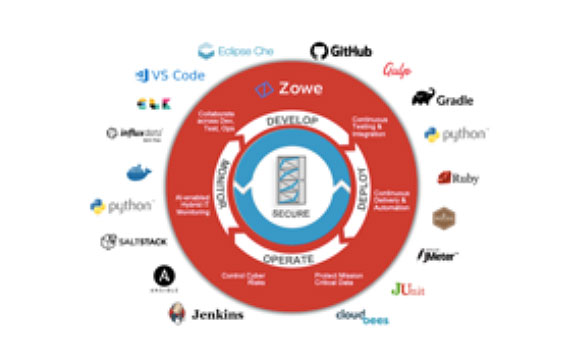
Open-Mainframe Project
Before we dive into Open-First, let’s take a look at the Open Mainframe Project. The Open Mainframe Project is an active part of the Linux Foundation. The Open Mainframe Project bridges the mainframe to popular off-platform tooling and automation where the modern developer has built their talent.
Zowe is an open-source initiative as part of the Open Mainframe Project and is an integrated and extensible open-source framework for z/OS. Zowe has the following main components:
- Command-line interface (CLI)
- API Mediation Layer (APIML)
- IDE Extension (VS Code)
- Software Development Kit
- Web UI (UI)
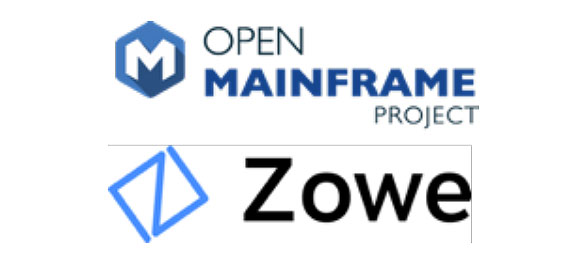
Such extensions include:
- Secure Credential Store plugin
- z/OS-Extended-Files plugin
- z/OS-Extended-Jobs plugin
Open-First allows for development tools of choice to be used. Traditionally mainframe developers had to use proprietary tools and newer developers found this too cumbersome to learn or deploy. Now through the integration of Zowe many popular tools such as Git, Jenkins, SonarQube, and VisualStudio can seamlessly integrate into core business applications. This includes scripting tools such as Python and nodeJS, as well as infrastructure automation tools such as SaltStack and Ansible.
Open-source development empowers developers with modern, shift-left capabilities that eliminate repetitive, manual tasks and fuel productivity. Developers can have confidence to edit with advanced utilities & debug with native mainframe tools. They can access scripts to build, deploy, and test using enterprise CI/CD pipelines. Developers can also visually explore monolithic applications interactively and proactively validate performance of code changes. Essentially, open-source development enables the modern developer, who may be new to the mainframe, to be productive on Day 1.
Broadcom Solutions to Achieve Interoperability
What we are experiencing is the best of both worlds. By extending the offerings of Zowe to the mainframe, the developer is now provided with a seamless interoperability between modern toolchains and native mainframe tooling. An example of this integration is achieved via product sets such as Brightside and Endevor Bridge for Git.
Brightside is an award-winning offering from Broadcom that delivers enterprise-grade support for Zowe and Code4z. It also provides innovative extensions for corporate needs.
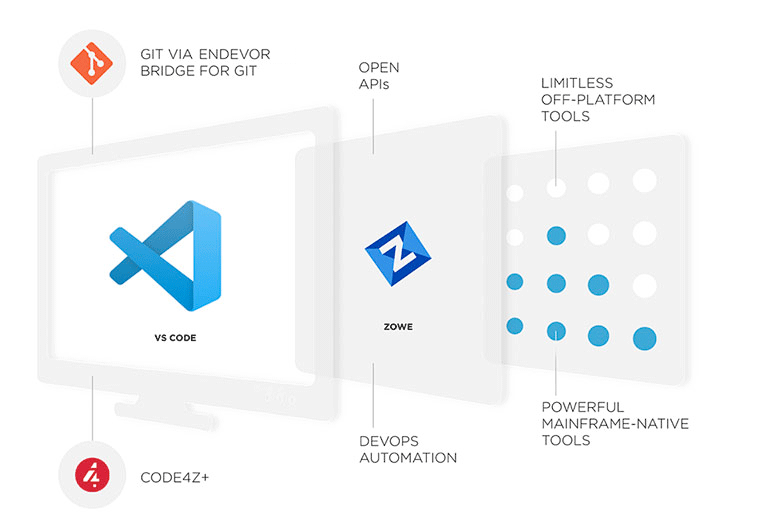
In this integration, Git complements Endevor purely as source control and a collaboration tool with its branching and merging capabilities. Endevor keeps the role of not only source control for MF developers, but also a build machine and life-cycle automation system for the application. The user experience remains the same for both MF developers (Eclipse UI or ISPF in Endevor) and Git developers.
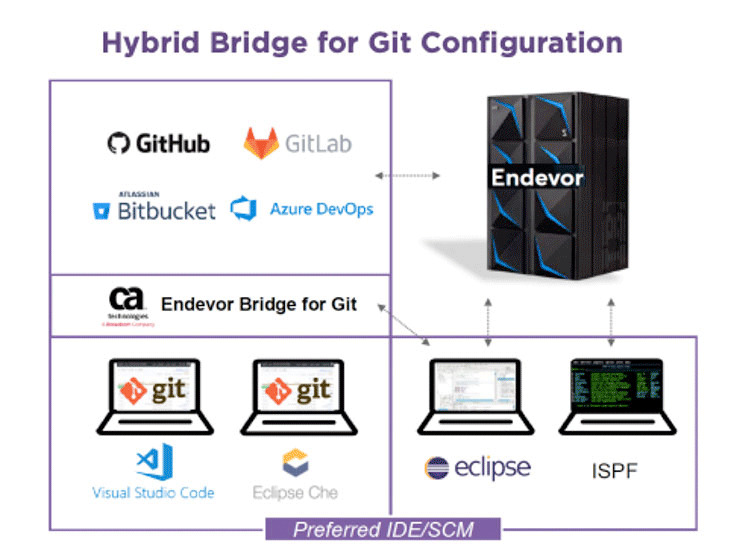
Closing thoughts
With the on-going innovations that are being seen in both the mainframe hardware and mainframe software level, organizations that have invested in this enterprise platform can continue to have the confidence of their choice. The mainframe’s importance in this hybrid business architecture of both Cloud and mainframe will continue to demonstrate as indispensable – especially for future business growth and survival.
As the speed of agility makes its mark on enterprise DevOps, we find the importance of toolchains being seamlessly integrated to be ever so important. As shown in the brief example, the modern developer can be effective in designing the next generation mobile interface or application that utilizes the business applications on a mainframe. Skills are maximized and the best of both worlds become a possibility.
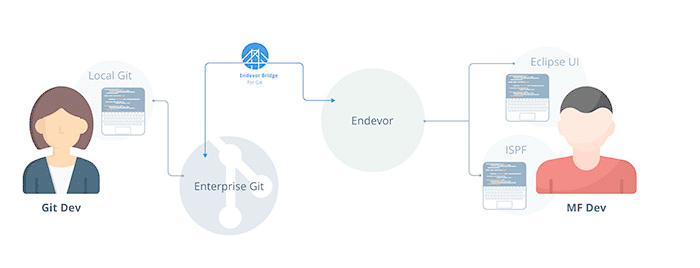
Mainline is a Broadcom Strategic partner, the highest level in the Broadcom partner program. Together we deliver business solutions to our mainframe customers, helping them to modernize their mainframe platforms, improve ROI and unlock business value. Read about our partnership here.
To learn more about how mainframe modernization or DevOps solutions, please reach out to your Mainline Account Executive directly, or contact us here.

